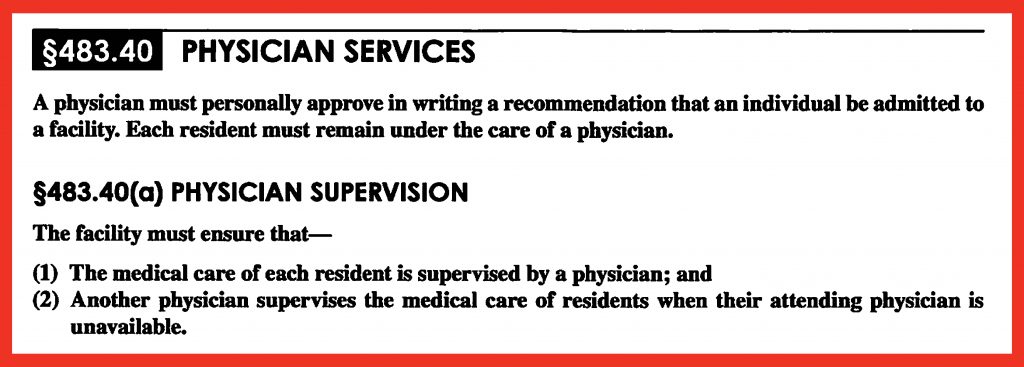Can I Sue a Nursing Home for Failure to Follow Physician’s Orders?
Yes. A nursing home can be held responsible for failure to follow physician’s orders.
A nursing home that fails to follow a physician’s orders may be liable for neglect. In fact, thousands of lawsuits are filed every year due to injuries resulting in this type of negligence.
In a case involving failure to follow physician’s order, the resident or resident’s family may be awarded damages for medical bills, funeral expenses, wrongful death, as well as pain and suffering.
There is simply no excuse for failing to follow a physician’s orders, especially when the consequences for nursing home residents can be so severe.
If you’re wondering if you’re entitled to damages for nursing home negligence, feel free to call one of our experienced Georgia nursing home neglect lawyers for a consultation.
- Nursing home physician’s order showing that the resident should receive a nutritional supplement.
For a free legal consultation with a failure to follow physicians orders lawyer serving Georgia, call
Why are Physician’s Orders Issued?
Orders are not just for prescriptions and medications. Orders encompass all types of critical care. For example, pressure ulcer care or trach tube cleaning. That’s why it is important for orders to be accurate, accessible, and followed.
Orders for nursing home residents are issued for the same reasons as the general public. These are the most common:
- Change in Condition. Changes in condition include significant weight loss over certain periods of time, the loss of abilities of daily living like walking or dressing, diminishing cognition, and infection. When a change in condition occurs, the nurses are required to notify the physician. Typically, this results in a new physician’s order.
- Physical Trauma. After a fall, physical altercation, or other physical trauma, a doctor is likely to issue new orders addressing both the cause of the problem as well as the resulting injury.
- Wound Development. Skin integrity is critical to the health of nursing home residents. At the signs of a pressure ulcer, deep tissue injury, or abrasion, nurses will notify the physician who will then prescribe specific treatments.
- Appearance of Illness. Nurses are required to take the vital signs of residents at regular intervals. Understanding fluctuations in vital signs is important to spot the first signs of illness and infections. Once an infection is identified, the doctor is called to provide new orders in response.
- Admission. At admission, the doctor will have orders ready for the nursing home.
- SBAR forms like this are used to document changes in condition. Changes in condition are almost always followed with a new set of physician’s orders. Failure to follow the physician’s orders can lead to injury.
Georgia Failure To Follow Physicians Orders Lawyer Near Me (678) 823-7678
What Should I do if My Loved One was Injured due to a Failure to Follow Physician’s Orders?
At all times, your primary focus should be to make sure your loved one receives proper medical treatment. Negligence in caring for a nursing home resident contributes to damaged health and wellbeing, pain and suffering, and sometimes death. If that means calling 9-1-1 to get them out of the facility, so be it.
But, if your loved one is currently in a stable condition and you suspect that the nursing home has intentionally or negligently failed to follow the physician’s orders, here are some action items:
- Request the Care Plan and Orders. Representatives of residents are entitled to request and review the nursing home’s records. Demand to see them! Look and see what the orders entail and whether the staff are following through.
- Speak with the Physician. Go straight to the horse’s mouth. Let the doctor know that you suspect that the nursing home is not doing its duty. Often the doctor will quickly get to the bottom of the issue.
- Request a Meeting with Administrator. Go and speak to the administrator or executive director. Let that person know that you are concerned.
- File a Grievance. All nursing homes are required to accept and investigate written grievances from residents. Let the administrator know that you want to file a formal grievance.
- Federal regulations like this one require physician supervision of all residents.
When are Physician’s Orders Issued?
Under Georgia state law, a nursing home is required to provide residents with adequate care based on their individual needs. Nursing homes are also required to have physicians available at all times to attend to residents’ needs, and to consult with physicians regarding care for nursing home residents.
There are no set times in which new physician’s orders may be prescribed. However, here are the most common times:
- During Visits. Attending doctors come to the nursing home at regular intervals, typically every 90 days. During the visits, the physician will assess the resident for any changes in condition. Depending on the health status, the doctor then will issue orders and place them in the resident’s file.
- At Admission. Residents will not be admitted to a nursing home without an order from a doctor. Aside from the order prescribing nursing home care, the orders at admission may also call for other items, like therapy or specific interventions.
- By Phone or Facsimile. Sometimes, nurses will call or fax particular symptoms to the doctor. Relying on these descriptions, the doctor will then issue new orders over the phone or fax.
What are Some Signs of Failure to Follow Physician’s Orders?
Failing to follow physician’s orders can result in all types of injuries. This means there are potentially an infinite number of symptoms. However, here are some common signs of negligence:
- Weight Fluctuation. Significant weight loss or gain can be a good indicator that something is wrong. While not always a result of negligence, it’s still a good idea to stay on top of this.
- Wound Development. Staff should be all hands on deck when a pressure wound occurs. As such, if a pressure ulcer continues to worsen, this may mean that the nursing home is not following orders.
- Behavior Change. Moving from talkative to quite, tame to aggressive, or happy to side can be a sign that medications are not being administered, or not enough. It could also be a sign of other health changes.
- Mental Change. A loss of mental cognition is a red flag that the nursing home may be missing something.
Failure to follow a physician’s orders may bring serious consequences. If you believe nursing home staff or caregivers have neglected to follow the physician’s orders in caring for your loved one, you should take action immediately in order to minimize the damage and prevent further injury to your loved one.
Why does Failure to Follow Physician’s Orders Occur in Nursing Homes?
Failure to follow physician’s orders may occur in nursing homes that are understaffed, or in nursing homes where staff are inexperienced or uneducated. When there are not enough staff to care for all of a nursing home’s residents, caregivers tend to be overworked and neglectful – either intentionally or unintentionally. An overworked caregiver may forget about a physician’s orders for a certain resident, or they may ignore the orders simply to save time or effort.
Failure to follow physician’s orders may also occur when nursing homes have a high staff turnover or employ multiple caregivers in treating one resident. If a caregiver has not previously cared for a certain resident, they may be unaware of the doctor’s instructions, and the previous caregiver or nursing home supervisor may have neglected to inform them.
Other times, nursing home staff are simply negligent and may purposefully ignore a physician’s orders in treating a certain patient. A caregiver may try to make things more convenient on him or herself by ignoring a doctor’s orders, or may intentionally abuse a resident by failing to provide needed care.
What Should a Nursing Home do to Prevent Failure to Follow Physician’s Orders?
To prevent failure to follow physician’s orders, nursing homes should pay careful attention to the doctor’s instructions regarding each nursing home resident, and then follow those instructions in caring for residents.
Nursing home supervisors should make sure caregivers and staff are aware of the physician’s orders and follow them closely. If a supervisor suspects that a caregiver has failed to follow the physician’s orders, the supervisor should step in immediately. Additionally, nursing homes should impress upon their employees the importance of following doctor’s orders in caring for residents, and the severe consequences of failing to follow those orders.
Nursing homes should always maintain a sufficient number of staff to ensure residents are not neglected, and they should screen all prospective employees thoroughly before hiring them.
Supervisors should also make sure caregivers who are aware of the physician’s orders for a certain resident continue to care consistently for that resident. Frequent, random changes in staffing or in caregivers’ responsibilities may contribute to failure to follow physician’s orders, since new caregivers may be unaware of the doctor’s instructions regarding that resident.
Contact a Georgia Lawyer for Nursing Home Failure to Follow Physician’s Orders
Contact a lawyer to get a consultation regarding your loved one’s case. If failure to follow physician’s orders in a Georgia nursing home has caused your loved one harm, suffering, or death, you may be able to file a claim against the nursing home and receive compensation for your loved one’s pain and suffering, as well as for any related medical bills. In case of your loved one’s death, the nursing home may also be required to compensate you or your family for your loss.







